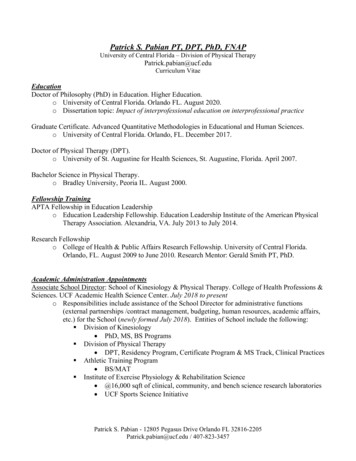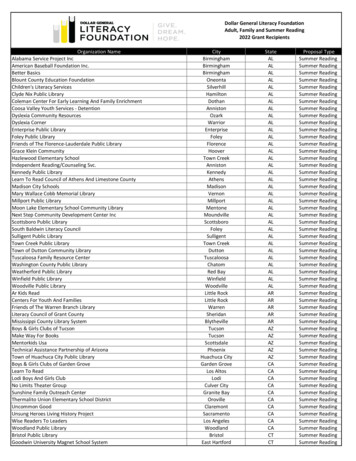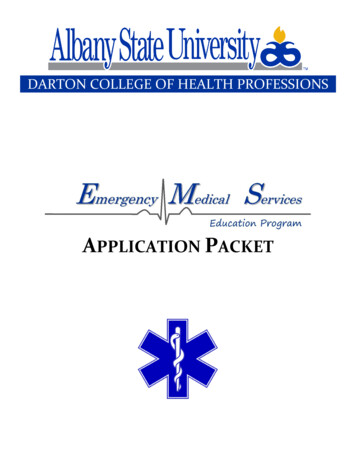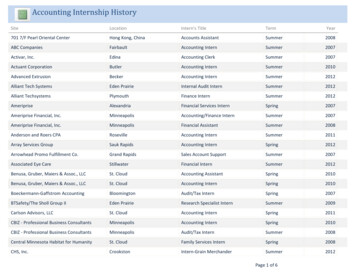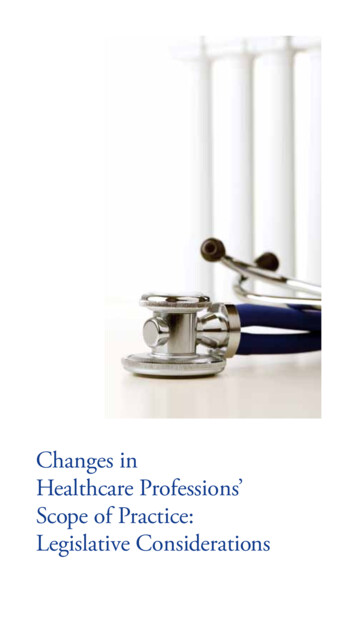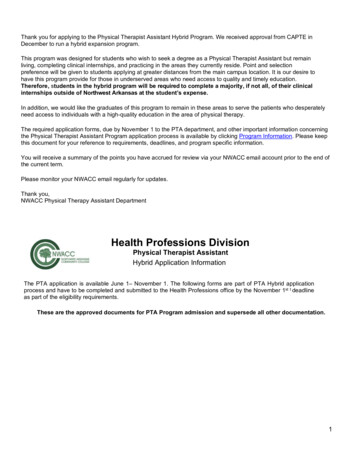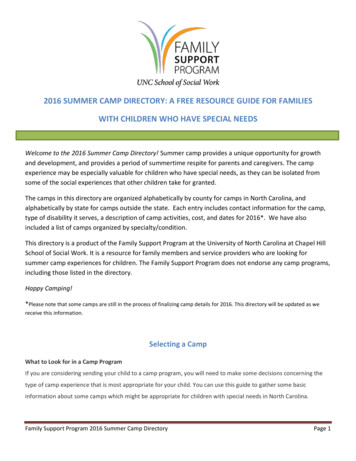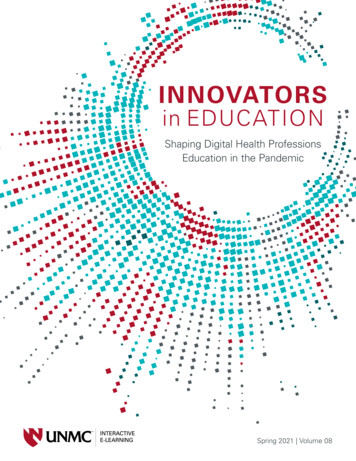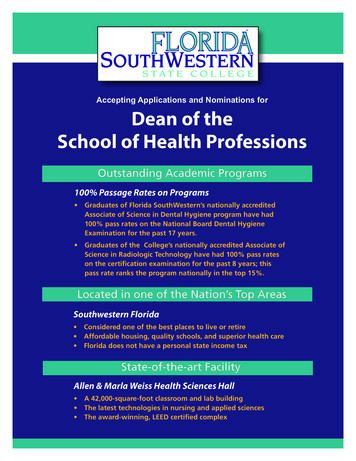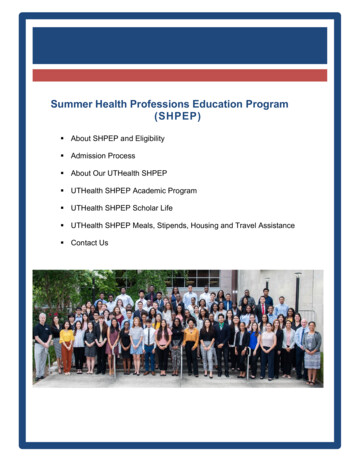
Transcription
Summer Health Professions Education Program(SHPEP) About SHPEP and Eligibility Admission Process About Our UTHealth SHPEP UTHealth SHPEP Academic Program UTHealth SHPEP Scholar Life UTHealth SHPEP Meals, Stipends, Housing and Travel Assistance Contact Us
Summer Health Professions Education Program(SHPEP)About SHPEPThe program has been shaping careers and changing the lives of premedical andpredental college students for 30 years, formerly as the Summer Medical and DentalEducation Program (SMDEP). Today, the SHPEP initiative has expanded to include otherhealth careers, such as nursing, pharmacy, physician assistant and public health.Hosted at 13 institutions across the nation, SHPEP’s goal is to strengthen the academicproficiency and career development of students underrepresented in the healthprofessions and prepare them for a successful application and matriculation to healthprofessions schools. These students include, but are not limited to, individuals whoidentify as African American/ Black, American Indian and Alaska Native and Hispanic/Latino, and who are from communities of socioeconomic and educational disadvantage.For additional information, please visit www.shpep.org.EligibilityAll students who meet the SHPEP eligibility requirements are encouraged to apply.Applicants must meet the following requirements: Be a college freshman or sophomore at the time of application Have a minimum overall GPA of 2.5 Be a U.S. citizen, a permanent resident, or an individual granted deferred action forchildhood arrivals (DACA) status by the U.S. Citizenship and Immigration Services Not have previously participated in the program.Other factors for consideration include that a student: Identifies with a group that is racially/ethnically underrepresented in the healthprofessions; Comes from an economically or educationally disadvantaged background; and/or Has demonstrated an interest in issues affecting underserved populations. Submits a compelling personal statement and a strong letter of recommendation
Admission ProcessThe SHPEP application deadlines are listed below. Interested students are encouragedto apply. Applications will begin in December.The following chart highlights the application, review, and notification process.Application OpensApplication ClosesNotificationResponse to OfferNovember 1February 5March 15Within 48 hours ofnotificationYesWaitlist OfferedApplication materials must include the SHPEP online application form, official transcriptsfrom all post-secondary schools attended, and one letter of recommendation from eithera pre-health advisor or a college professor within your major field of study. For moreinformation regarding the SHPEP application and notification process please visitgo.uth.edu/shpep.About Our UTHealth SHPEPUHealth is an academic health center that educates more than 5,000 professionals eachyear, and that delivers health care to patients with diverse cultures, beliefs andnationalities. UTHealth is committed to creating an environment that values inclusion,collaboration, partnerships and teamwork to accomplish its mission.The UTHealth SHPEP is grounded in collaborative relationships between the UTHealthMcGovern Medical School, School of Dentistry and School of Nursing, which are the fourhealth professions of interest for our program. The curriculum focuses on Basic Sciences,Academic Enrichment and Professional Development.The Basic Sciences core curriculum is structured around courses relevant to healthprofessionals, including Anatomy and Physiology, Microbiology, Physics, Statistics,Organic Chemistry.The UTHealth SHPEP leaders recognize that the skills of well-rounded health professionsstudents and health care providers go beyond competency in basic sciences. Changesin US demographics and issues of access to care create the need for individuals able towork across cultures. New models of health care delivery, such accountable careorganizations, create the need for individuals with the leadership skills to make these newmodels a successful part of our health care culture. As we create a culture of health, thosewithin the professions must understand the broad definitions of individual and collectivecommunity wellness and engage in practices that promote both. And finally, as we movetowards patient centered, team-based care, having individuals who understand, value3
and work towards the goal of interprofessional education and practice is essential forthese models to be effective. Our Academic Enrichment and Professional Developmentcurricula will help prepare students in these areas and serve to augment the BasicSciences curriculum.Interwoven throughout the curriculum and student experiences is the central theme ofwellness and nutrition. This topic spans basic and clinical sciences in nursing, medicineand dentistry and the highlights how the lack of wellness and poor nutrition contributes toobesity, the leading health problem in the US. This theme also allows the program tohighlight the interprofessional collaboration between healthcare providers needed toaddress this multi-faceted healthcare challenge.UTHealth SHPEP Academic Program4
Core Academic CurriculumThe core academic curriculum will have courses in organic chemistry, physics (for thoseinterested in medical and dental careers), anatomy and physiology, microbiology andstatistics. Lab experience in the human anatomy facility at the medical school will beoffered through the six-week experience. Examples of the topics covered in the corecurriculum are listed below:Organic ChemistryOrganic chemistry is a specific discipline withinchemistry which involves the scientific study ofthe structure, properties, composition, reactions,and preparation (by synthesis or by other means)of chemical compounds consisting primarily ofcarbon and hydrogen. Class time will be a mix oflecture and group work to aid in the understandingof key concepts. Homework assignments willreinforce and develop the ideas discussed inclass.PhysicsThis course will provide students with an introduction to some of the key concepts inphysics, such as motion, force, heat, fluids, and waves. An emphasis will be placed onhow the physical principles apply to the mechanics of the human body. Class time willconsist of a combination of lecture, demonstrations, and hands-on group work. Homeworkassignments will reinforce and develop the ideas discussed in class.MicrobiologyThis course will serve as a general introduction to pathologies caused by microorganismsfrom the perspective of etiologic agents, symptoms, prevention, and treatment. Interactivelectures will provide theoretical background for diagnosis of real-world case studies ingeneral medicine and dentistry.Anatomy and Physiology (A&P)The lecture portion of A &P emphasizes problem solving with clinical situations thatinvolve anatomical terminology, homeostatic mechanisms and pathologies associatedwith the skeletal, muscular and nervous systems. The lab portion includes hands-on grossanatomy lab experiences with bones, joints, muscles, brains and other internal organs.StatisticsStatistics is the study of research outcomes. Over the six weeks, you will be introducedto the concepts that are used in reporting the results of research. Even if you will not beproducing research in your practice, you will likely be reading the results of others'research.An understanding of statistics is essential if you want to read the reports in academicjournals. Class time will be a mix of lecture and group work. Homework assignments willreinforce and develop critical thinking based on the ideas learned in class. Calculator Requirement for Statistics Course5
Accepted scholars are required to bring a statistics-friendly calculator for the Statisticscourse: Texas Instruments 83 or 84. Specs/features and user guide may be accessed byclicking on the following links:oooTI-83 PlusTI-84 Plus Silver EditionGuide for TI-83, TI-83 Plus, or TI-84 Plus Graphing CalculatorAcademic Enrichment and Professional Development CurriculumExamples of topics to be covered in the academic enrichment and professionaldevelopment curriculum are listed below:Health PolicyHealth Policy is the study to improve health systems to meet their objectives in terms ofhealth outcomes, financial protection and responsiveness to the population’s legitimateexpectations. This six-week educational experience will focus on key principles in policymaking and health policy and exposure to critical health care issues.Professionalism and Cultural CompetencyScholars will experience special topics in humanism,professionalism, ethics and cultural competency.These topics will be introduced by highly regardedfaculty with known expertise in these areas.Communication SkillsSmall-group experiences in the Art of Communicationcourse will help develop communication skillsrelevant to health professionals. Scholars also willprepare for health professions school interviews byworking on mock interviews with the tutors.Clinical ExposureScholars will experience limited clinical exposure through a diverse range of settingsincluding shadowing individual clinicians, small-group clinical rotations and full-groupseminars with highly experienced and expert clinicians.Learning Skills DevelopmentEmphasis is placed on developing learning strategies to be a successful student inprofessional school. Topics may include strategies to improve study habits, note-takingstrategies, test-taking skills, time management, and use of information resources (libraryand Web).Financial PlanningA nationally recognized expert in financial planning will work with the scholars to assistthem in developing individualized career plans and in implementing financial managementstrategies.6
UTHealth SHPEP Scholar Life7
STUDENT LIFEHouston is a diverse city with a large and growing international community. Many annualevents celebrate the diverse cultures of Houston. The largest and longest running is theannual Houston Livestock Show and Rodeo, held over 20 days from late February toearly March, which is the largest anywhere in the world. Another large celebration is theannual night-time Houston Pride Parade, held at the end of June. Other annual eventsinclude the Houston Greek Festival, Art Car Parade, the Houston Auto Show and theBayou City Art Festival, which is considered to be one of the top five art festivals in theUnited States.Houston has an active visual and performing arts scene. The Theater District is locateddowntown and is home to nine major performing arts organizations and six performancehalls. Houston is one of few US cities with permanent, professional, resident companiesin all major performing arts disciplines; Houston Grand Opera, Houston Ballet, HoustonSymphony Orchestra, and The Alley Theater.The Museum District has many popular cultural institutions and exhibits, which attractmore than 7 million visitors a year. Notable facilities include The Museum of Fine Arts,Houston, Houston Museum of Natural Science, The Health Museum, the ContemporaryArts Museum, Houston, the Station Museum of Contemporary Art, Holocaust MuseumHouston, and the Houston Zoo. Located outside, but within proximity of the MuseumDistrict are The Menil Collection and Rothko Chapel. Houston has teams for nearly everymajor professional sport. The Houston Astros (MLB), Houston Texans (NFL), HoustonRockets (NBA), Houston Dynamo (MLS), Houston Energy (IWFL), Houston Power(WFA), and the Houston Lightning (SIFL) all call Houston home.8
SOCIAL ACTIVITIES (FREE)SHPEP-sponsored events include a Welcome Dinner at check-in, scholar talentshow, and Graduation Ceremony with reception. Scholar-organized events haveincluded movie nights in the dorm and cookouts on the Rice campus. Additionalactivities in the Houston metro area are listed below:Free ActivitiesThe Museum of Fine Arts, Houston(Free on Thursdays)WalkableMetroCar/ OtherXXXXThe Menil CollectionHolocaust MuseumXXXHouston Museum of Natural ScienceXXXMiller Outdoor TheatreXXXXXXXXXXXFree ActivitiesWalkableMetroCar/ OtherHouston ZooAstrosHouston Summer Boat ShowThe Health MuseumSan Jacinto Monument and Museum of HistoryBattleship TexasDowntown AquariumXXXXXXXXXXXXXBuffalo Soldiers National Museum(Free Thursday 1-5pm)Children’s Museum of Houston(Free Thursday 5-8pm)The Health Museum(Free Thursday 2-5pm)SOCIAL ACTIVITIES (FOR A FEE )XAlley TheatreXKemah BoardwalkXXXXMoody GardensNASASpace Center HoustonTexas Seaport MuseumXIce Skating at the GalleriaXXBowlingXX9
DRESS CODEStudents are expected to maintain a professional personal appearance at all times.Alternatively, option to wear scrubs daily while on campus.During operating hours, infection control mandates that students may not wear any of thefollowing: shorts mini-skirts open-toed shoes tank tops capri pants muscle shirts halter tops baseball caps jeans tennis shoes (unless wearing scrubs)Scrubs are required in order to participate in the Clinical Observation andSimulation Lab sessions for nursing, medicine and dentistry participants. In thisinstance, you MUST also wear tennis shoes that are CLEAN and covering theentire foot.These personal appearance standards are in effect from 7:00 a.m. to 6:00 p.m.Monday through Friday. Students who are not in compliance with these minimal dressrequirements will not be allowed to remain in the building and will be required to returnto the dorm to change clothes.10
UTHEALTH SHPEP Meals, Stipends,Housing and Travel AssistanceMealsAt least two meals per day, Monday-Sunday.Students may also have the opportunity topurchase Tetra cards (Rice U. meal cards)during the check-in process, to be used onthe Rice campus only (eateries & the“convenience stores”.)StipendsStipends, totaling 600 for the entire program,will be distributed on the following dates: June 1June 16July 1The dollar amounts of each stipend will be calculated according to the total number ofdays of the program/number of days in each pay period.Housing: Rice University Dorm InformationRice is a private, independent university dedicated to the "advancement of letters,science, and art." Occupying a distinctive, tree-shaded, nearly 300-acre campus onlya few miles from downtown Houston, Rice attracts a diverse group of highly talentedstudents with a range of academic studies that includes humanities, social sciences,natural science, engineering, architecture, music, and business management.Rice University is approximately three blocks from the UTHealth McGovern MedicalSchool (MS). Scholars will walk to the MS for classes/events when scheduled in thatbuilding. When scheduled at the UTHealth School of Dentistry (SOD) or School ofNursing (SON), scholars will use the UTHealth Shuttle which picks up outside the MS.UTHealth ID Badges are REQUIRED to board the shuttles. Laundry Facilities areavailable in each residential college free of charge.Travel Assistance to/ from HoustonNeed based with cap of 500/eligible disadvantaged scholars. Scholars need tocomplete application to apply for assistance. Scholars must live more than 100 milesfrom SHPEP site to be consider for air travel assistance. If students are traveling morethan 100 miles away from SHPEP site, we will reimburse car mileage after completionof program.If you have, questions contact Griselda Avila (UTHealth-SHPEP@uth.tmc.edu),SHPEP Manager.11
Things to bring to the Rice DormEach student will be assigned a twin bed/mattress, closet or wardrobe, desk and deskchair. There are no phones or phone service.Things TO bringLinens - Single Twin Sheets (2 each, flat,not fitted)Things NOT TO bringAir conditioning units (window or room units)BlanketCandlesPillow and PillowcaseBox fansBath Towels (2 each)Charcoal grillsWash Cloths (2 each)Electrical cooking appliancesBath Robe & SlippersCrock potsToiletriesElectric skillets (microwaves available for rent)Toilet paperGeorge Foreman GrillsClothing detergentHalogen lampsAlarm clock or clock radioHot oil popcorn poppersUmbrellaPower toolsInsect repellentRice cookers/steamersSun screenSpace heatersCalendar (daily planner)Toasters or toaster ovensCameraDO NOT BRING FITTED SHEETS (Beds are extra-long)First aid suppliesDO NOT BRING REFRIGERATORS ORMICROWAVES – RENTAL AVAILABLEDownload application form and fax to Griselda Avilaat 713-486-4173.Gary & Yvonne Harvin H& H Home ServicesP.O. Box 2373Cypress, TX 77410Phone: 281-379-2045 Fax: 281-379-7394hhhomeservices@att.netFlashlightTV (can be rented through H&H HomeServices)Iron and Ironing board, HangersLamps – small, for studyingMoney for meal supplement/unexpectedcostsNo painting, paneling, construction, nails, screwsor tape on walls or doors.Sewing kitTape, scissors, staplerTelephone cards (long distance)12
TRANSPORTATIONTravel to the Dorm at Rice UniversityCostFromYellow Cab*William P. Hobby Airport (HOU) to Rice UniversityYellow Cab*George Bush Intercontinental Airport (Houston International Airport) (IAH)to Rice University 35.00SuperShuttleHobby to Rice UniversitySuperShuttleIntercontinental to Rice University 23.00 65.00 27.00*Yellow Cab was chosen only to provide an estimate of the cost for taxi fares. No endorsementor recommendation is intended or implied. Costs may vary depending on traffic and route.Shuttle TransportationSuperShuttle operates from both airports.Travel Around HoustonHouston has an excellent mass transit system through the Metropolitan TransitAuthority of Harris County. The Metro website provides information about bus and lightrail routes, schedules and fares.Parking Rice Campus Maps Driving Directions to Rice Campus13
Contact UsProgram ManagerGriselda “Grace” AvilaOffice of Student & Academic AffairsSHPEP Manager and Point of ContactPhone: 713-486-4151Fax: 713-486-4173E-mail: Griselda.Avila@uth.tmc.eduProgram DirectorsRobert D. Spears, PhDProject Principal Investigator SHPEP – School of DentistryProfessor, Diagnostic and Biomedical SciencesSchool of DentistryPhone: 713-486-4151Fax: 713-486-4173E-mail: Robert.D.Spears@uth.tmc.eduPedro Mancias, MDCo-Director SHPEP – McGovern Medical SchoolAssistant Dean for Diversity and InclusionProfessor, Department of Pediatrics, Division of Childand Adolescent NeurologyMcGovern Medical SchoolPhone: 713-500-7113Fax: 713-500-0604E-mail: Pedro.Mancias@uth.tmc.eduErica Tengyuan Yu, PhD, RN, ANPCo-Director SHPEP – Cizik School of NursingAssistant Dean, Undergraduate ProgramsDepartment of Acute & Continuing CareCizik School of NursingPhone: 713-500-2160Fax: 713-500-2171E-mail: Erica.Yu@uth.tmc.edu14
The program has been shaping careers and changing the lives of premedical and predental college students for 30years, formerly as the Summer Medical and Dental Education Program (SMDEP). Today, the SHPEP initiative has expanded to include other health careers, such as nursing, pharmacy, physician assistant and public health.
